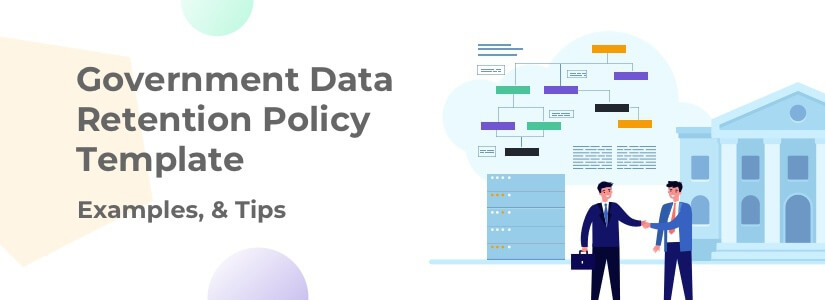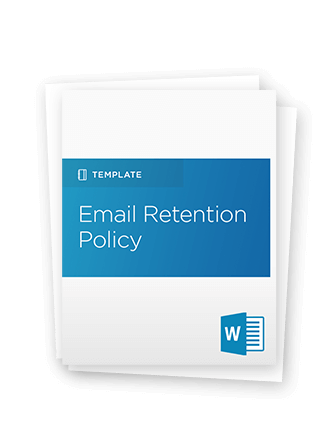Government Data Retention Policy Template, Examples & Tips

In today’s world, organizations of almost any size are required to retain records, typically for a specified period of time. These retention periods are determined by statute or regulation coming from all levels of government. While there are certain industries that typically require longer retention periods for more types of data, such as banking and transportation, government bodies and agencies often have the strictest requirements of all.
In this blog post, we will define the concept of data retention, as well as data retention policies and periods, specific requirements for government agencies and more.
What is Data Retention?
Aptly named, data retention, or record retention, is the practice of storing and managing data and records for a designated period of time. Government institutions must follow both internally set guidelines and comply with regulations stemming from all sources above. To fulfill these requirements, it’s imperative that every organization develop and implement a data retention policy.
What is a Data Retention Policy & Why is it Important?
A data retention policy, or a record retention policy, is an organization’s established protocol for maintaining information. Typically, a data retention policy will define:
- What data needs to be retained
- The format in which it should be kept
- How long it should be stored for
- Whether and when it should eventually be archived or deleted
- Who has the authority to dispose of it
- Reporting requirements
Government institutions are some of the most regulated bodies in the world, and as such, those responsible for staying compliant must be even more vigilant than those operating in the private sector.
What is a Data Retention Period?
A data retention period refers to the amount of time that an organization holds onto information. Different data should have different retention periods. Data retention periods for government agencies are governed by specific requirements, so it’s important to research before determining the retention periods for your data retention policy.
What are the Requirements for Government Agencies?
The requirements for government bodies and agencies are set by a combination of those further up the regulatory chain and the institutions themselves. As such, it’s impossible to exhaustively list all regulations for every institution; however, we’ll go over two at the federal level as examples.
Federal Information Security Management Act
First passed in 2002 and updated in 2014, the Federal Information Security Management Act is a wide-ranging piece of legislation designed to set out storage and security requirements for government data. It requires contractors and all federal agencies to comply with an extensive set of requirements and retain relevant data for a minimum of three years.
NARA Code of Federal Regulations
While the overall purpose of the NARA Code of Federal Regulations is to establish electronic information systems and ensure their security, Subchapter B is dedicated to digital record-keeping requirements. It states:
“Agencies must capture, manage and preserve electronic records with appropriate metadata and must be able to access and retrieve electronic records, including electronic messages, through electronic searches.”
Also, “all records in the system are retrievable and usable for as long as needed to conduct agency business and to meet NARA-approved dispositions.”
What are the Best Practices Government Data Retention Policies Should Follow?
- Do your research first. Make sure you are aware of and understand all regulations that apply to your institution and any legal obligations before you get started.
- Determine what your needs are. Although statutory and regulatory requirements are the top priority, any data retention policies that you implement should also be designed in such a way that they streamline critical processes and promote operational efficiency.
- Make data retention policy development a team effort. In order to create a record retention policy that is truly comprehensive and represents the interests of your entire organization, you need input from multiple voices That will include departmental legal counsel, the finance department, the accounting team and other top managers.
- Don’t overcomplicate things. Use simple language and straightforward terms when drafting retention policies. This will make them easier for employees to understand and also increase the likelihood of adherence.
- Create different policies for different data types. Not every piece of information needs to be stored for the same length of time — it varies depending on operational needs and applicable regulatory and/or statutory requirements.
- Invest in an archiving solution. Certain email, social media and text/SMS messaging archiving platforms enable you to create custom record retention policies and automate the data retention process, thereby saving you time and effort. Look for a solution that enables you to organize data according to all governing statutes, regulations and operational requirements and that also offers robust search functionality and has compliant built-in security features.
- Consistently back up your data. Doing so will not only protect you from a compliance standpoint but also reduce the risk of data loss in the event of an outage.
- Don’t hold on to data longer than is necessary. Although it might seem like best practice to operate with an abundance of caution and retain data indefinitely, doing so leaves you exposed to risk and might violate statutes or regulations.
How do I Create a Compliant Data Retention Policy?
Though the process for creating a record retention policy will vary depending on the type of data you capture and applicable statutes and regulations, it will probably look something like this:
- Assemble your data retention policy development team.
- Sort data into policy categories as defined by relevant oversight guidance; you’ll need to create a different data retention policy for each category.
- For each record retention policy:
- Determine which items will be archived (and for how long) and which ones will be deleted by referring to relevant statutes, regulations and organizational needs
- Decide who will be responsible for each item type
- Develop a plan for enforcing the policy
- Communicate the policy to all affected employees and teams, including any potential legal consequences they could face as a result of a violation.
- Create the policy.
- Update each policy on a regular basis and take care to communicate any changes made to your employees.
- For even more guidance on how to create a data retention policy, download our free data retention policy template.
Make Data Retention Easy with Intradyn
From email to social media content and text/SMS messages, each of Intradyn’s state-of-the-art archiving solutions enables you to create custom data retention policies that ensure regulatory and statutory compliance. Find out what Intradyn is capable of with our free on-demand demo, or by talking to one of our archiving specialists today.

